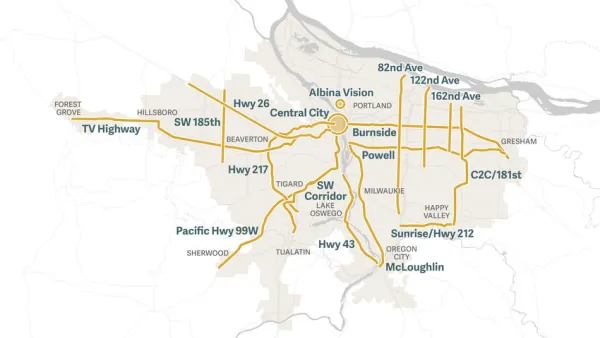In the first part of a series examining the failure of Portland-area fair housing, Brad Schmidt explains how a region that prides itself on its progressive values and openness to diversity is "harboring a form of institutionalized racial inequity."
The four-part investigative series launched by The Oregonian, titled "Locked Out," looks at how public agencies in Portland and its surrounding counties have failed to fulfill the requirements attached to the $170 million a year in federal money they receive for affordable housing. By accepting such funds, the agencies are bound by the federal Fair Housing Act to spread affordable housing across neighborhoods, and avoid concentrating poverty or people of color. "In taking the money," Schmidt notes, "they explicitly promise to identify and dismantle barriers to those efforts."
Unfortunately, in findings that echo a recent report out of Texas, Schmidt's investigation has discovered, "That's not happening."
"Instead, residents who could most benefit from good schools, safe streets, abundant grocery stores, nearby parks and high-achieving role models are largely locked out of the neighborhoods that have them."
"Schmidt's investigation found that taxpayer money meant to help break down segregation and poverty is instead reinforcing it. Housing is subsidized in the poorest neighborhoods and often in areas with above-average minority populations. And few poor people and people of color get to live in desirable communities such as inner Southeast Portland and Lake Oswego."
FULL STORY: Failure to support Fair Housing Act leads to subsidized segregation: Locked Out, Part 1

National Parks Layoffs Will Cause Communities to Lose Billions
Thousands of essential park workers were laid off this week, just before the busy spring break season.

Retro-silient?: America’s First “Eco-burb,” The Woodlands Turns 50
A master-planned community north of Houston offers lessons on green infrastructure and resilient design, but falls short of its founder’s lofty affordability and walkability goals.

Delivering for America Plan Will Downgrade Mail Service in at Least 49.5 Percent of Zip Codes
Republican and Democrat lawmakers criticize the plan for its disproportionate negative impact on rural communities.

Test News Post 1
This is a summary

Test News Headline 46
Test for the image on the front page.

Balancing Bombs and Butterflies: How the National Guard Protects a Rare Species
The National Guard at Fort Indiantown Gap uses GIS technology and land management strategies to balance military training with conservation efforts, ensuring the survival of the rare eastern regal fritillary butterfly.
Urban Design for Planners 1: Software Tools
This six-course series explores essential urban design concepts using open source software and equips planners with the tools they need to participate fully in the urban design process.
Planning for Universal Design
Learn the tools for implementing Universal Design in planning regulations.
EMC Planning Group, Inc.
Planetizen
Planetizen
Mpact (formerly Rail~Volution)
Great Falls Development Authority, Inc.
HUDs Office of Policy Development and Research
NYU Wagner Graduate School of Public Service





























